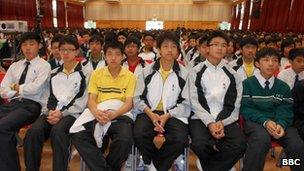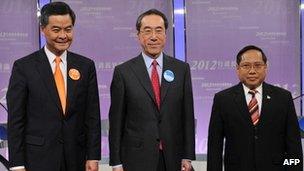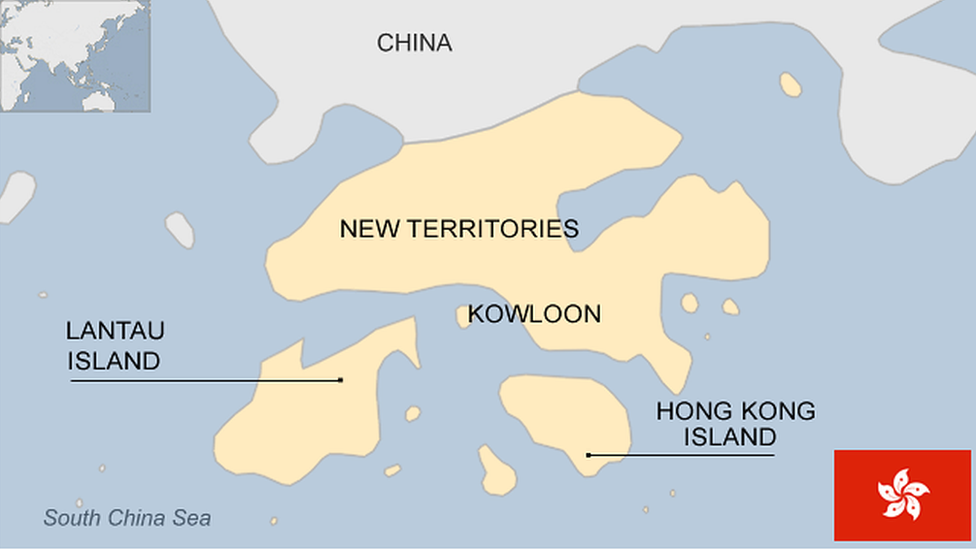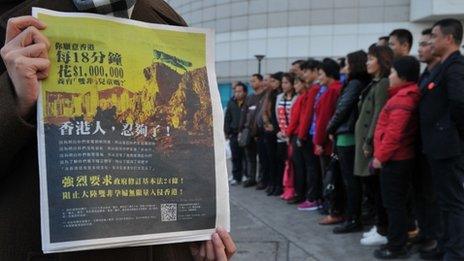Hong Kong's race at the top ignites democratic desires
- Published
Political scandal fuels calls for democracy in Hong Kong
In an airy auditorium at Fung Kai Number One Secondary School in Hong Kong, about 900 students sat and listened as one of their teachers gave them a civics lesson.
The right to select their next leader is a key part of citizenship, they heard, as photos were shown of the three men running to become the city's next chief executive.
After the lecture, the students returned to their classrooms, where everyone took turns using computers to cast votes for the three candidates - Henry Tang, CY Leung or Albert Ho - as part of a city-wide mock election.
Hong Kong residents do not yet have the right to directly select their top official, but the desire for universal suffrage is strong, according to students and teachers at Fung Kai, one of the biggest schools in Hong Kong.
Eunice Leung, 16, is sharply critical of the current system, in which fewer than 1,200 electors largely loyal to Beijing will choose the Chinese city's top official on 25 March.
"They are given the right to choose the chief executive, but the decision they are going to make cannot represent all Hong Kong people. That's why it is a very unfair election," she said, after casting her vote.
Though it was meant to be a secret ballot, Ms Leung revealed she voted for Mr Ho, chairman of the Democratic Party, whose main platform is universal suffrage.
Because of his outspoken pro-democracy stance, Mr Ho is widely seen as being unacceptable to Beijing.
His two rivals are more familiar to the establishment.
Two systems
When Hong Kong rejoined China in 1997 after 150 years as a British colony, certain rights and freedoms not granted on the mainland were guaranteed here.

Students at Fung Kai Number One Secondary School cast mock votes for candidates
Among them was the right to elect the chief executive, a position roughly equivalent to mayor of Hong Kong, China's most international city and a global financial powerhouse.
But Beijing has dragged its heels on actually giving Hong Kong citizens that right.
Robert Chung, an influential pollster who organised the city-wide popular vote, said the desire for universal suffrage has been whipped up even more by a series of embarrassing scandals revealed during two months of campaigning.
"As it turns out, the election is getting more and more exciting. The candidates themselves are really trying to face the general public to gain support," he said.
Even though the candidates are not elected directly, they must win some level of popular support.
Otherwise, people may take to the streets to protest against a deeply disliked leader foisted on them, as they did in 2003, creating a crisis for Beijing.
While Hong Kong may lack some of the rights and institutions guaranteed in a democratic system, it does have a lively, free-wheeling press as competitive as any in the West.
In February, an enterprising Chinese-language newspaper published what it said were details of an enormous and illegal luxury basement belonging to the family of Henry Tang, one of the three contenders.
The news eventually set off a media frenzy, rare even for Hong Kong.
The candidate denied the accusations for days before finally confessing in an emotional press conference, where he blamed his wife.
"I apologise to the people of Hong Kong," the then-frontrunner said, adding he hoped the public would give him another chance.
Mr Tang, who had trailed the more populist Mr Leung in opinion polls, saw his public approval ratings sink further.
While "basement-gate" was probably the most memorable scandal uncovered by the media, Mr Leung has also been targeted.
Newspapers reported that some of his aides had attended a dinner in which a well-known gangster was present, leading to charges of triad involvement in politics.
Mr Leung has denied those charges.
More protests?
What was meant to be a carefully choreographed leadership race has been upended by Hong Kong media.

CY Leung, left, Henry Tang and Albert Ho are running for chief executive in Hong Kong
The outcome of Sunday's election appears uncertain.
Some lawmakers have said that Beijing is now actively lobbying for the relatively more popular Mr Leung instead of Mr Tang, the previous favourite.
But election committee members have also been urged to cast blank votes to protest against the unprecedented mudslinging, amid concerns none of the three candidates are fit to run Hong Kong.
Several political parties and dozens of civic groups have vowed to take to the streets on Sunday to challenge what they call a "small circle election" decided by Beijing and the tycoons loyal to China.
Thousands of people are expected to take part.
The students at Fung Kai secondary school follow the news with interest. Ms Leung, the 16-year-old student, said she did not trust Mr Tang and Mr Leung because of the scandals that came to light.
"I think our future leader should have some important qualities. He should be honest. As you know, honesty is the best policy," she said.
Beijing has said it may allow Hong Kong citizens to choose their chief executive in 2017.
If that happens, then some of the students at Fung Kai will have the right to vote by the time they graduate.
- Published7 January

- Published8 February 2012
